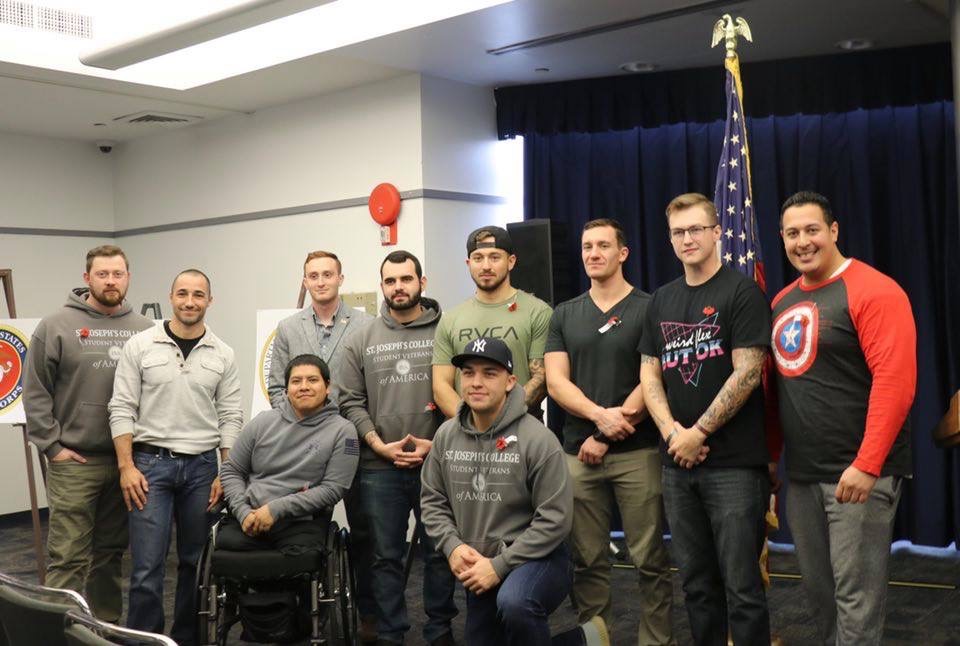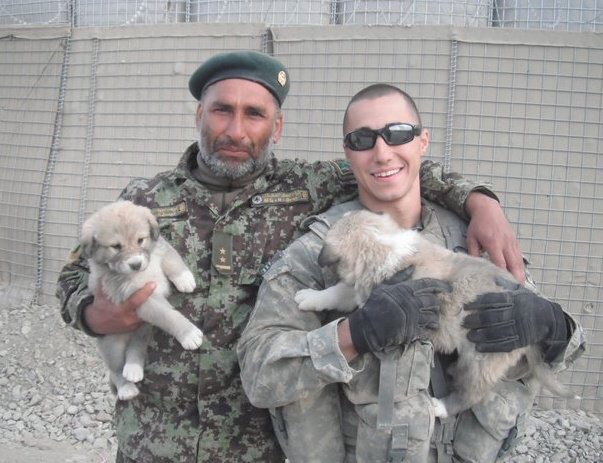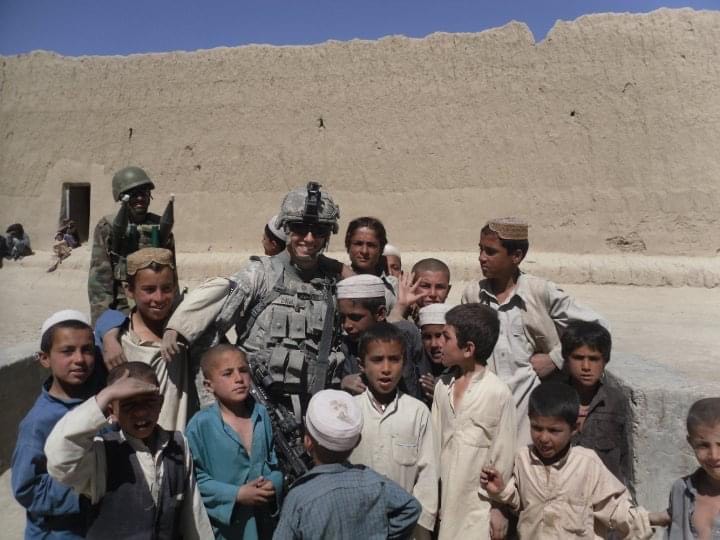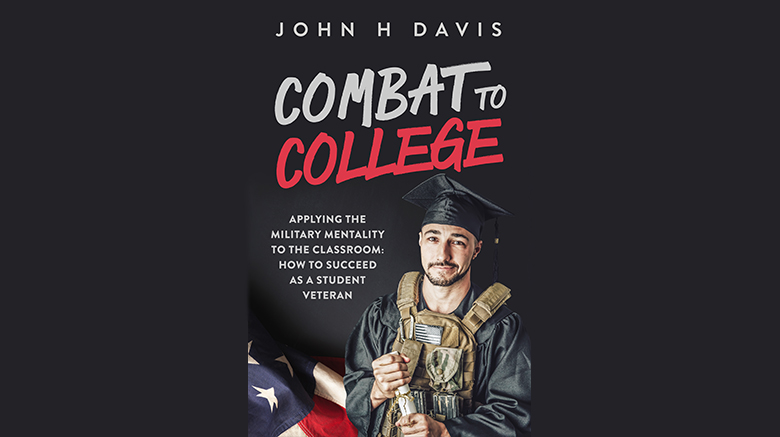After eight years in the U.S. Army, including two tours in Afghanistan, it wasn’t easy for Staff Sergeant John Davis to sit in the unfamiliar environment of a college classroom.
But after a few difficult weeks at SJC Long Island, the student veteran realized he could use the same skills that helped him in the military to allow him to succeed in school.
Davis has written a book to help other student veterans realize the same thing. “Combat to College: Applying the Military Mentality to the Classroom: How to Succeed as a Student Veteran” was self-published on March 13.
Davis, who earned his degree in history with a concentration in adolescence education in January 2020, answered a few questions about himself, his time in the military and what led him to write the book.
OnCampus: What inspired you to write “Combat to College”?
John Davis: I wanted to earn some extra money while I was at St. Joseph’s, and the VA had a work-study program for veterans at St. Joseph’s. My job was to help other veterans in their educational goals and provide resources about benefits, as well as mentorship. This led to me sitting down with veterans who were struggling with various college challenges. I really got a lot from helping other veterans and realized by helping others I was also helping myself.
 The book is a compilation of those lessons to give veterans strategies to be successful in college. I heard and listened to the problems veterans were having, and I knew firsthand the problems I had to wrestle with.
The book is a compilation of those lessons to give veterans strategies to be successful in college. I heard and listened to the problems veterans were having, and I knew firsthand the problems I had to wrestle with.
I also believe that if veterans went to school at higher rates and graduated at higher rates, then PTSD, depression, suicide, alcohol and drug problems, homelessness and even suicide would all decline in the veteran community. Only about half of veterans go to college, even though many of them can go for free or at a reduced rate.
OC: What was your biggest challenge when returning from the military and transitioning to the college environment?
JD: My challenges were that I was older than everyone in all of my classes, had PTSD and just in general more responsibilities than the traditional student. I had a mortgage, been divorced and just different life experiences than students around me. I felt out of place and isolated in the classroom. And it can be difficult to be the only veteran in the room, especially as a combat veteran.
OC: In general, why do you think it’s so hard for veterans to transition from the military to being a college student?
JD: The toughest part about the transition is that the military is such an extremely structured and rigid environment, and college life is the opposite. In the Army, if you don’t show up for work in the morning at 6 a.m., then someone is going to be banging on your door and you’re going to be in trouble. In college, often the accountability aspect you are used to has disappeared.
Also, in the military, everyone is on the same side and working together for a common purpose. It doesn’t always feel that way in the civilian world.
OC: What about St. Joseph’s makes it an open, welcoming college environment for student veterans?
JD: I just felt at home there, even being a veteran. St. Joseph’s has a specific veteran counselor, Erin D’Eletto, who helps student veterans with a variety of concerns, ranging from academic to social and personal. We also have our own space, the Veteran Resource Center (VRC), which gives us a home there. In the VRC, we could connect with other like-minded student veterans, which is an invaluable resource provided by the College. In my classes, professors were open to the fact that student veterans can enrich classroom environments with their life experience, and the small classes made the classes interactive, so we could get to know traditional students as well.
The school also has a variety of military-friendly events around holidays and does a good job connecting students from all walks of life and backgrounds to provide a positive educational environment. The sisters there are great too, as they provide a solid moral compass for the school and help everyone remember the importance of making the world a better place with our thoughts and actions. Veterans often need academic support from taking such a long break from school, and St. Joseph’s makes tutoring accessible, and professors are very open to one-on-one discussions and individual academic support outside of class times.
OC: What’s one thing you want traditional students (students who enter college at 18) to understand about student veterans? What about professors?
JD: I’d like to think that student veterans have something to teach traditional students. In the military, you learn about mental toughness and how to work hard. Military students are always on time for classes because that is ingrained in them, and traditional students can learn from that.
 I’d also like them to know that student veterans are students too. We want the normal college experiences and to be involved in Greek life, clubs, study groups and more. The student veteran population shouldn’t be separate from the student population, but instead be in groups that can work together and learn a lot from one another. I had a 19-year-old tutoring me in Spanish because I hadn’t taken Spanish in 10 years, so be willing to help us out a bit.
I’d also like them to know that student veterans are students too. We want the normal college experiences and to be involved in Greek life, clubs, study groups and more. The student veteran population shouldn’t be separate from the student population, but instead be in groups that can work together and learn a lot from one another. I had a 19-year-old tutoring me in Spanish because I hadn’t taken Spanish in 10 years, so be willing to help us out a bit.
I want professors to understand that student veterans can enrich the classroom environment for other students. Often student veterans have direct experience about some of the topics in the classroom. I took a Middle Eastern history class, and I spent almost three years in the Middle East. So I know quite a bit from those experiences and studying Muslim culture and religion. Student veterans can bring an interesting perspective to the classroom, and I would like professors to make attempts to involve student veterans more in the classroom. We are often hesitant to speak up because we feel out of place in the classroom, so awareness of that would be beneficial.
OC: If there’s one piece of advice you hope other veterans gain from this book, what is it?
JD: I would like other veterans to feel confident in their ability to go to college and be successful there. So many other veterans don’t go to college and undervalue education, but with military experience and a college degree, I think a lot of doors will open for veterans.
One piece of important advice would be to not get overwhelmed, especially the first semester. My book chapter that covers this is called “Lighten Your Load,” and it’s about not allowing problems outside the classroom to affect your education.
OC: Last time we spoke, you said you joined the Army because you wanted to fight. Can you elaborate on that?
JD: I remember 9/11. When I was thinking about joining the military, we were already at war in Afghanistan, so I did some simple research about Afghanistan. I was pretty ignorant to gender discrimination in education at the time, but seeing that girls there weren’t allowed to go to school or learn how to read was shocking to me. I think everyone has a responsibility to make the world a slightly better place, and you have to fight a bit to do that. That’s part of what I wanted to fight for.
OC: You got into Harvard — congratulations! What do you plan on majoring in while there? Are you set to start there in the fall?
JD: It was a little shocking to get in. Dr. Barry, Dr. Fuchs and Dr. Pellicano helped me with my application and with advice on my entrance essay, so I’m very grateful for them. I start there in August, and I’m majoring in international education.
OC: What are you planning on doing after you receive your master’s from Harvard?
 JD: My plan is to teach in conflict zones or refugee camps in the middle east. Gender discrimination in education is very real in third-world countries, and witnessing it was a transformative experience. I feel like it is my calling to work for quality and relevant equal educational opportunities for all. I think education can help prevent future conflicts, and education is often underserved where it is most needed and over-served where it is least needed.
JD: My plan is to teach in conflict zones or refugee camps in the middle east. Gender discrimination in education is very real in third-world countries, and witnessing it was a transformative experience. I feel like it is my calling to work for quality and relevant equal educational opportunities for all. I think education can help prevent future conflicts, and education is often underserved where it is most needed and over-served where it is least needed.
OC: As someone who’s held an impressive book drive and now has written a book, it seems you’re probably a pretty passionate reader. Would you say that’s true?
JD: Yes. I grew up in a print-rich environment, and my mother would read to me every night as a kid. I think that benefitted me a lot, and I want to be able to pass that on to parents — how important it is to read to your kids.
OC: What’s your favorite book and why?
JD: My favorite book is “The Obstacle Is the Way” by Ryan Holiday, and it’s my go-to recommendation for people who ask me for a book recommendation. It shows people to not avoid challenges, but instead seek them out.
OC: Who’s your biggest inspiration in life and why?
JD: Right now, Dan Crenshaw. He is a Navy SEAL who lost an eye in Afghanistan and then went to Harvard, and he is now a Congressman in Texas. He’s extremely well spoken, and I would not be surprised to one day see him as President.
OC: Interesting hobbies?
JD: I like riding my Harley and traveling. I graduated in December and travelled around Asia for 40 days. I went to Vietnam, Laos and Cambodia and got to look at the U.S. bombing of those areas during the Vietnam conflict.

